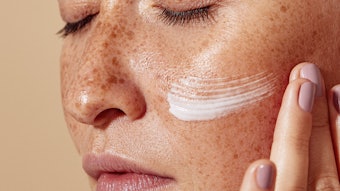
Summer brings sunshine, fresh air and the desire to show off some skin. However, for the millions of Americans with eczema and psoriasis, the summer months can mean irritated skin and the desire to cover up.
Meghan Feely, board certified dermatologist and member of the American Academy of Dermatology (AAD), spoke with Skin Inc. on how to step in when clients’ skin reacts to the heat, humidity and allergens of the warmer months.
Eczema
On paper, eczema patients cannot win in the summer. According to Feely, the condition’s signature compromised skin barrier does not respond well to summer stimuli. Humidity, heat and seasonal allergies can serve as triggers. Since the body’s natural cooling method is to sweat, and sweat and water exposure draw moisture from the skin, it is more difficult to control the body’s temperature in the summer.
On paper, eczema patients cannot win in the summer.
“Ironically, water draws the moisture out of your skin,” Feely noted, since hot weather and increased perspiration during warm summer months dries out the skin
The key is to moisturize safely and often—fragrance-free moisturizers, in addition to patients’ typical treatments, can help prevent exacerbated eczema symptoms. For situations when triggers are unavoidable, such as swimming in a chlorinated pool, Feely recommends patients shower immediately afterward to rinse off the irritating chemicals before patting dry and applying moisturizer. She also advises avoiding irritating fabrics, such as wool and wearing breathable clothing made of cotton.
Cool compresses, topical corticosteroids, topical calcineurin inhibitors (TCIs) and antihistamines can help relieve patients’ eczema symptoms during difficult summer months to help reduce inflammation. For more serious cases where the itch is interfering with lives and sleep, adjunct treatments include phototherapy and oral immune-suppressing medications.
Psoriasis
On the other hand, the elements that work against eczema care are advantageous for psoriasis patients. Increased humidity keeps skin moist, while UV rays from sun exposure provide some relief to the irritated skin.
“For many patients with psoriasis, summer can be their good time of year unless they overdo it,” said Feely, noting that trauma from sunburn can worsen the condition and develop new psoriatic plaques (an example of the koenber phenomenon), and that patients should be counseled to always wear sunscreen and to limit their sun exposure.
“For many patients with psoriasis, summer can be their good time of year unless they overdo it." —Meghan Feely, board certified dermatologist and member of the AAD
Sebopsoriasis patients are not as lucky—this condition primarily affects the face and can flare in the summer due to irritants. It—and these conditions as a whole—can also be triggered by stress, which for some patients decreases over the summer as they take vacations to relax a bit more than during the cooler months, according to Feely.
Skin protection is still as vital as repairs in the summer. Dermatologists should advocate moderation and a fragrance-free sunscreen, even when flare-ups are under control. Topical corticosteroids are also effective for psoriasis patients, along with nonsteroidal topical treatments such as salicylic acid, topical retinoids, anthralin and topical vitamin D.
Seasons Change
Once the irritants of summer fade into fall, patients should still maintain care routines. Feely suggests a “holiday from medication” in the winter if eczema patients’ skin clears up. The reduced natural light exposure of fall may negatively affect patients without controlled psoriasis symptoms, but in all cases, Feely recommends patients maintain habits such as sun protection and see dermatologists as needed to help their skin transition with the season.
“I encourage patients to always maintain good habits. … For patients with these conditions, we would advise them to get in touch with a board certified dermatologist,” said Feely.










